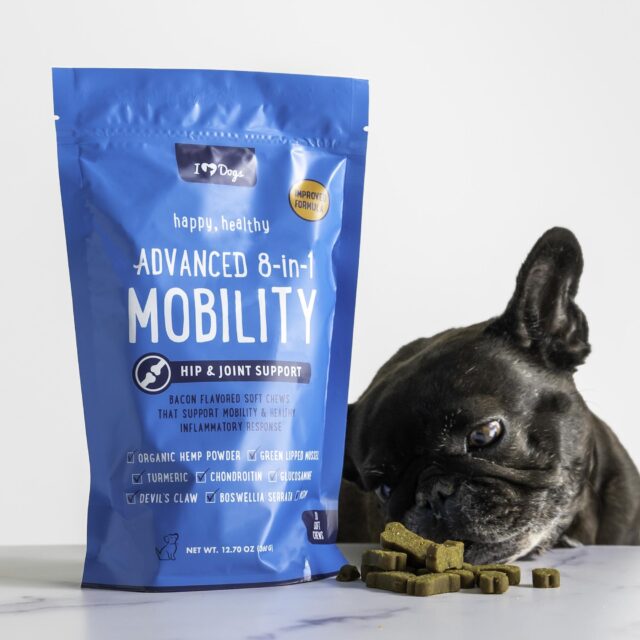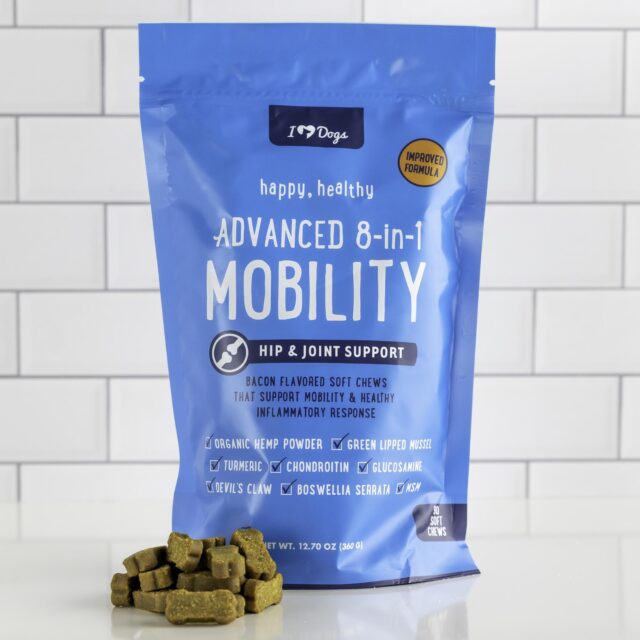There’s no step-by-step guide on how to ensure your pup lives a long and happy life, and it’s up to you to make decisions for their well-being. You have the support of your veterinarian and other pet professionals, but every question from what training technique to use to how often to trim their toenails is ultimately up to you.
It’s a lot of pressure, but deciding whether or not your dog will benefit from a daily joint supplement doesn’t have to be complicated. Nothing can substitute advice from a trustworthy veterinarian, but there are a few easy-to-recognize signs that suggest your dog’s joints could use a little extra help.

#1 – They’re Heading Toward Their Golden Years
As your dog ages, their once sprightly body gradually starts to slow down. The cartilage that cushions their joints deteriorates, and all their years of running, jumping, and chasing balls catches up to them. Sometimes a senior dog’s slowing down is caused simply by their advanced age, but many times, arthritis is to blame. There’s no cure for aging, and there’s no cure for arthritis, but preventing joint pain is a way to turn back the clock on your dog’s health.
Once a dog reaches seven years old, they’re typically considered to be a senior. They could have several more years left to earn belly rubs and head scratches, but as they age, the need for a supplement becomes more apparent. The Dog Daily reports around 90 percent of older dogs have osteoarthritis in at least one joint. Your dog might not be showing outward signs of joint pain, but there’s a good chance the beginning stages of osteoarthritis are already happening. Starting them on a supplement will help them stay healthy and pain-free.
#2 – Their Breed is Prone to Joint Problems
It’s easy to tell the difference between a Miniature Poodle and a Great Pyrenees. One fits easily into your lap while the other struggles to fit their bulk into an over-sized armchair. Which kind of dog you have will determine how big a bed you need, and it also plays a role in when you should start buying canine joint supplements. There are certain breeds that have a genetic predisposition to developing joint problems including arthritis, hip dysplasia, and elbow dysplasia. The list consists of mostly large and giant breed dogs as well as breeds with long backs and short legs
For these dogs, the earlier they’re started on a joint supplement, the better their chances are of staying healthy. Because joint problems are especially common in their breeds, veterinarians often recommend starting them on a daily supplement around the time they turn one year old or when their body stops growing. Arthritis is most common in senior dogs, but that doesn’t mean your young pup is immune. Arthritis affects dogs of all ages, especially if their breed is on this list.
- American Staffordshire Terrier
- Basset Hound
- Bernese Mountain Dog
- Chow Chow
- Dachshund
- German Shepherd
- Great Dane
- Great Pyrenees
- Golden Retriever
- Labrador Retriever
- Mastiff
- Saint Bernard

#3 – They Live an Active Lifestyle
Some dogs are happiest on the couch cocooned in the plushest blankets, but then there are dogs that simply can’t keep still. They’re the ones that drag their families on hikes and run miles without slowing down. They chase balls, weave through polls, swim in lakes, and are happiest when their four paws are on the move. These active pups put their muscles and joints to the test, and a joint supplement mixed in with their daily meal can be the fuel they need to keep going.
Athletic dogs tend to put more stress on their joints than their snooze-loving friends. Working dogs like police dogs, service dogs, and herding dogs that spend several hours a day being active often have to cut their careers short because of eventual joint pain. Over time, their active lifestyles become too much for their joints to handle.
A supplement like iHeartDogs’ own Happy, Healthy™ Advanced 8-in-1 Hip & Joint Chews for Mobility with Glucosamine, Chondroitin, MSM, Organic Turmeric, and more helps keep the cartilage in joints strong and functional. Every leap, climb, and sprint will be working against them, but the right supplement can be just the defense they need to keep doing what they love.
#4 – They’re Overweight
While active dogs strain their joints through high-impact movements, dogs that are overweight deal with constant stress on their overburdened bodies. The extra pounds of fat they carry with them every day add to the normal wear and tear of cartilage. New studies also show the occurrence of arthritis in obese dogs has to do with more than gravity. According to Dr. Robin Downing with VCA Hospitals, the fat cells themselves also contribute to joint pain through hormone secretions. Dr. Downing writes,
“What we now know is that fat tissue is very biologically active and secretes hormones and other chemicals that both cause and enhance inflammation. The hormone leptin, which is produced by fat cells, causes inflammation when it infiltrates joints. In addition, leptin may influence the bone changes associated with osteoarthritis.”
The chance of a dog developing osteoarthritis in their lifetime is directly related to their weight. Extra weight will also make other joint conditions like hip dysplasia worse. Regular exercise and a healthy diet are essential to keep the number on the scale in a healthy range. If your dog is overweight, helping them slim down while providing a joint supplement will do a world of good.

#5 – They’ve Experienced a Traumatic Injury or Surgery
After experiencing the nightmare that is seeing your dog go through a veterinary emergency, the last thing you want to think about is the long-term effects of their situation. Hold them close and be thankful they’re still by your side, but you’ll also need to prepare for life “after.” Whether they ended up in a cast or needed surgery to save a limb, there’s a chance their traumatic experience will contribute to future joint pain.
When dogs are injured, they shift their weight off the affected limb. Even after they’ve healed, their bones might never be “normal” again, and they continue to compensate for the damage by putting more strain on their healthy limbs. In some cases, you won’t even know your dog is doing it. It’s easy to tell your dog suffered an injury when they’re bleeding or a bone is obviously broken, but some injuries are more subtle. The dog might appear to be acting normal, but their instinctual stoicism contributes to their ability to secretly adjust their gait and hide their pain. Either way, leaves a dog vulnerable to future joint pain.
#6 – They’re Already Showing Symptoms of Joint Pain
In an ideal situation, you’ll be able to stop your pup from experiencing the pain of a joint condition by preventing the condition from developing in the first place. Supplements can help with that, but for many dogs, joint pain is unavoidable. It sneaks its way into your dog’s life without you knowing.
Osteoarthritis is a chronic condition that has no cure, and if left untreated, it will only get worse with time. Other joint conditions, like hip dysplasia, can sometimes be cured with expensive surgery, but that isn’t an option for every dog. If you suspect your pup is already dealing with everyday joint pain, the time to invest in a quality joint supplement is now. It isn’t always easy to tell when a dog is in pain, but there are more than a few signs you can look out for. Some of the signs a dog is suffering from joint pain include:
- Limping or favoring one leg, especially after being inactive for a few hours
- Difficulty maneuvering stairs, jumping onto the couch, or doing other things they used to do easily
- Muscle atrophy caused by not wanting to use a painful body part
- Abnormal gait
- Spending more time sleeping
- Acting restless like they can’t get comfortable
- Whining or crying
- Unexplained irritability (you’d be grumpy too if you were dealing with chronic pain!)
No matter how tough your dog is, joint pain can be debilitating. As their condition progresses, you’ll notice them lose interest in things they used to love. Their quality of life will diminish, and that’s the last thing you want to happen. Starting them on a daily joint supplement is an easy and simple way to improve their health and well-being. Talk to your veterinarian about your dog’s joints, and start researching what makes a good joint supplement product. Your decision will be one that makes a noticeable difference for your favorite furry family member.


 Toledo, United States.
Toledo, United States.